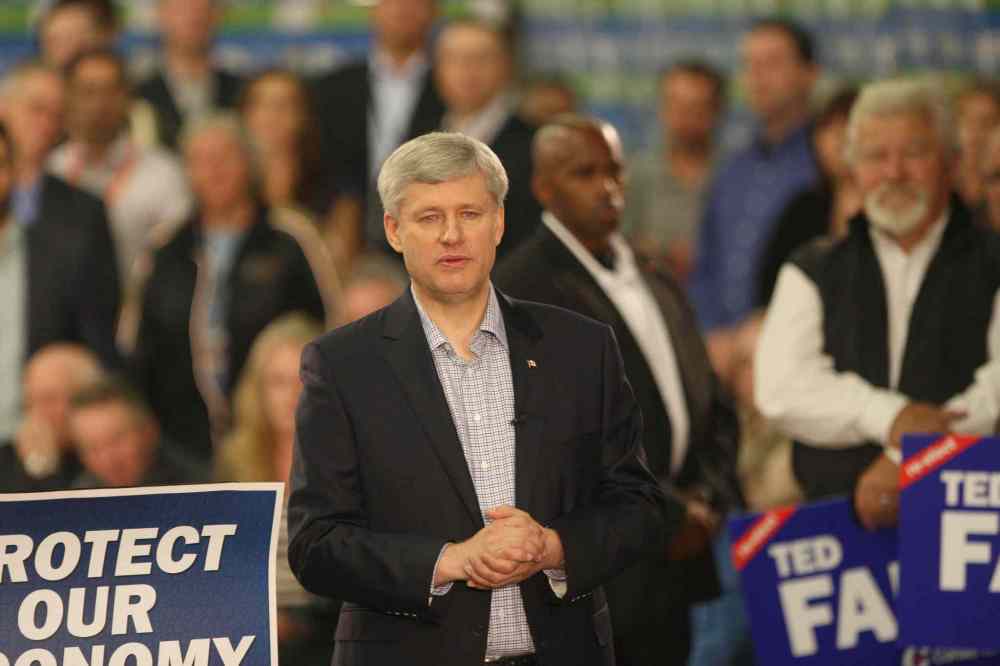Rebounding Tories could be the surprise
Advertisement
Read this article for free:
or
Already have an account? Log in here »
To continue reading, please subscribe:
Monthly Digital Subscription
$0 for the first 4 weeks*
- Enjoy unlimited reading on winnipegfreepress.com
- Read the E-Edition, our digital replica newspaper
- Access News Break, our award-winning app
- Play interactive puzzles
*No charge for 4 weeks then price increases to the regular rate of $19.00 plus GST every four weeks. Offer available to new and qualified returning subscribers only. Cancel any time.
Monthly Digital Subscription
$4.75/week*
- Enjoy unlimited reading on winnipegfreepress.com
- Read the E-Edition, our digital replica newspaper
- Access News Break, our award-winning app
- Play interactive puzzles
*Billed as $19 plus GST every four weeks. Cancel any time.
To continue reading, please subscribe:
Add Free Press access to your Brandon Sun subscription for only an additional
$1 for the first 4 weeks*
*Your next subscription payment will increase by $1.00 and you will be charged $16.99 plus GST for four weeks. After four weeks, your payment will increase to $23.99 plus GST every four weeks.
Read unlimited articles for free today:
or
Already have an account? Log in here »
Hey there, time traveller!
This article was published 03/10/2015 (3701 days ago), so information in it may no longer be current.
OTTAWA — Close to nine weeks ago, Prime Minister Stephen Harper kicked off the longest election campaign in modern Canadian history.
It has also been one of the most competitive.
While the campaign has meandered its way past beach days and swimming pool weather, through back to school, and into the pumpkin-spice-everything season, the decision for Canadians has not really become any easier.

In the last two elections, the question was never whether the Conservatives would win. The question was whether they’d win a minority or a majority. This election is different.
The outcome hasn’t been clear at any point.
The issues have been varied. The economy has been central throughout the race, but other things have emerged as unexpected issues. The refugee crisis and a debate about whether the niqab should be allowed at citizenship ceremonies weren’t really on the radar screen early on. Now they have become a central tenet of the campaigns.
But as expected, this campaign is in large part about whether Canadians want to keep the government they have or whether they’re ready for change. And for the first time in history, that alternative hasn’t been obvious.
The NDP and Liberals have been jockeying to be in that alternative position.
When the campaign began, NDP Leader Tom Mulcair looked like he was that guy. The NDP were out front in the polls, and Mulcair even refused to refer to Liberal Leader Justin Trudeau by name, believing calling him the “leader of the third party” would relegate Trudeau to also-ran, or irrelevant, status.
It says a lot about how much has changed now that Mulcair names Trudeau often and the NDP are running an attack ad directly targeting him.
The NDP hasn’t run a bad campaign, but it hasn’t been particularly well-organized or show-stopping either. Oddly Mulcair’s decision to insist on a balanced budget may be his biggest downfall. While the NDP more than any party needed the help of such a promise to offset stereotypes the party is filled with spendthrift bleeding hearts, it was perhaps the wrong election to take the stand.
Conversely, when Trudeau said he would run three small-ish deficits to invest in a flagging economy, observers thought he had just committed political suicide. Instead, many Canadians shrugged at the idea and economists noted small deficits or small surpluses are on the same page as long as the debt to GDP ratio is going down and the economy is growing. His opponents still attack him for it but after he made the pledge, his numbers started to go up.
At the end of August, Harper had been all but written off after a tough month on the campaign trail. The Conservatives were running third in most polls and the internal knives were being sharpened for the prime minister and his tightly controlled leadership style.
September has been far kinder to the Conservatives and they appear to have turned things around. Once the cacophony of #peegate and the Mike Duffy trial faded into the background, the naysaying voices have also gone quiet.
News that Canada was in a recession — technical or not — didn’t make the government look good, but that was offset when the government announced in a clearly pre-planned mid-campaign release, that the 2014-15 budget was balanced. The GDP figures reported in early September were bleak, but the revised numbers a month later were better.
The numbers are coming back up for the Conservatives. Harper is relaxed. He looks fitter and more energetic than he has in years.
The phrase never underestimate the power of incumbency may well become the way history looks back at this election.
Sixty-three days down. Sixteen days to go.
Mia Rabson is the Free Press parliamentary bureau chief.
mia.rabson@freepress.mb.ca Twitter: @mrabson











